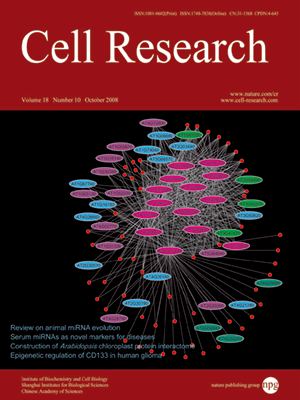
Volume 18, No 10, Oct 2008
ISSN: 1001-0602
EISSN: 1748-7838 2018
impact factor 17.848*
(Clarivate Analytics, 2019)
Volume 18 Issue 10, October 2008: 1047-1060
ORIGINAL ARTICLES
Soybean GmMYB76, GmMYB92, and GmMYB177 genes confer stress tolerance in transgenic Arabidopsis plants
Yong Liao, Hong-Feng Zou, Hui-Wen Wang, Wan-Ke Zhang, Biao Ma, Jin-Song Zhang and Shou-Yi Chen
Plant Gene Research Center, National Key Lab of Plant Genomics, Institute of Genetics and Developmental Biology, Chinese Academy of Sciences, Beijing 100101, China
Correspondence: Jin-Song Zhang Shou-Yi Chen(jszhang@genetics.ac.cn; sychen@genetics.ac.cn)
MYB-type transcription factors contain the conserved MYB DNA-binding domain of approximately 50 amino acids and are involved in the regulation of many aspects of plant growth, development, metabolism and stress responses. From soybean plants, we identified 156 GmMYB genes using our previously obtained 206 MYB unigenes, and 48 were found to have full-length open-reading frames. Expressions of all these identified genes were examined, and we found that expressions of 43 genes were changed upon treatment with ABA, salt, drought and/or cold stress. Three GmMYB genes, GmMYB76, GmMYB92 and GmMYB177, were chosen for further analysis. Using the yeast assay system, GmMYB76 and GmMYB92 were found to have transactivation activity and can form homodimers. GmMYB177 did not appear to have transactivation activity but can form heterodimers with GmMYB76. Yeast one-hybrid assay revealed that all the three GmMYBs could bind to cis-elements TAT AAC GGT TTT TT and CCG GAA AAA AGG AT, but with different affinity, and GmMYB92 could also bind to TCT CAC CTA CC. The transgenic Arabidopsis plants overexpressing GmMYB76 or GmMYB177 showed better performance than the GmMYB92-transgenic plants in salt and freezing tolerance. However, these transgenic plants exhibited reduced sensitivity to ABA treatment at germination stage in comparison with the wild-type plants. The three GmMYB genes differentially affected a subset of stress-responsive genes in addition to their regulation of a common subset of stress-responsive genes. These results indicate that the three GmMYB genes may play differential roles in stress tolerance, possibly through regulation of stress-responsive genes.
Cell Research (2008) 18:1047-1060. doi: 10.1038/cr.2008.280; published online 26 August 2008
FULL TEXT | PDF
Browse 2239


